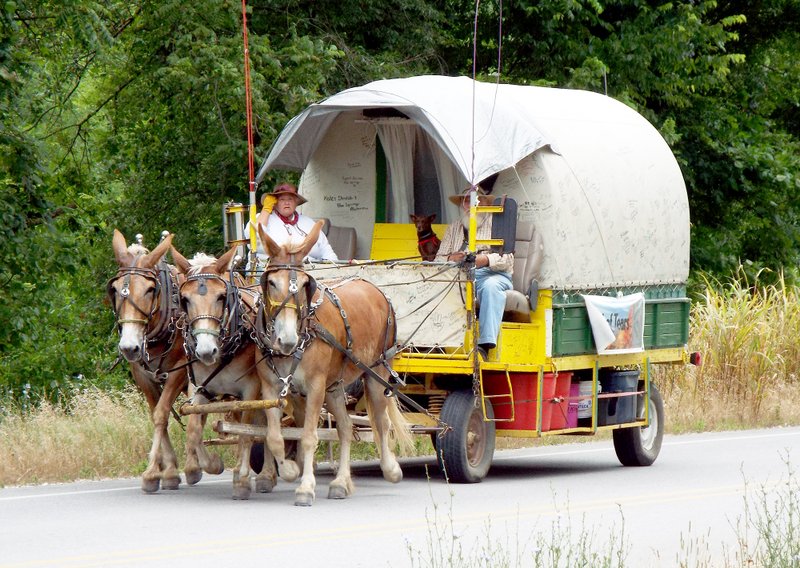GENTRY -- The 850 miles from Ashville, N.C., to Tahlequah, Okla., go by slowly -- at a mule's pace, to be exact. Ten to 12 miles a day is just the way Gene and Noqah Glasscock like it. Along the way, drivers slow and reach out of their windows to take pictures of the canvas-covered wagon adorned with signatures of people from along their route.
"My wife tells me I'm old enough to settle down," Gene said, tired from the day's travel. Inside the wagon, their queen-size bed is cluttered with items that fell off the shelves on the rough road.
"Everything we own is inside there," Gene said.
The Glasscocks are following the route of the Trail of Tears, a route over which thousands of Cherokee passed in 1838 and 1839 when moved from their homes in the East to Oklahoma. The couple is making a memorial ride for Noqah's son, Johnny, and "following in the footsteps of my grandmothers," she said, referring to her Cherokee roots.
Noqah and her son, Johnny Bunco, had talked for 20 years about following the Trail of Tears in honor of their ancestors. Then, Johnny died on Sept. 1, 2012. Noqah was left alone and grieving.
"Call Gene Glasscock," Noqah's nephew kept telling her. She stalled. She grieved. Then, in December 2012, she called. The two talked every day after that.
"I told him about what Johnny and I had been planning," she said. "He said he can't take a trip like that with a woman unless he's married to her."
So, the two were married and began the trek in the homemade wagon Gene had built and taken from the Atlantic to the Pacific and back again from 2010-2013.
"We're carrying his ashes," Gene said.
"On May 5, I finished the ride, ocean to ocean and back again. We got married right after that," he recalled.
Two of the three mules -- Kitty, 14, and Kate, 13 -- had pulled Gene's wagon on the journey across the country. Now, Buddy, 12, a smaller mule, joined them.
Noqah Elisi, 62, and Gene, 80, celebrated their second wedding anniversary on the trail. She will celebrate her birthday Aug. 2 on the return journey from Oklahoma to North Carolina.
She is originally from Big Brushy Creek, Green Mountain, N.C.
When asked where he's originally from, Gene smiled and said: "My mother." Then, he added that he's from a town "that's no longer there -- Clinton, Texas." He said he was raised in eastern Oregon, lived in Seattle (where he worked high-rise construction), Alaska, Mexico and Paraguay. He said he's had a life-long relationship with horses.
"I've seen pictures of me in diapers on horseback," Gene said, recalling that he got his first horse when he was about 11 and his parents got divorced. "I think it was a consolation prize for them splitting up."
He has six children, 42 grandchildren and innumerable great-grandchildren. His children's opinions of his travels vary and include: "Daddy, you don't belong out on the road like that. You belong here"; and "Daddy knows what he's doing; he enjoys doing it; leave him alone." ("I like that boy," he said, a smile covering his face.")
"At one time," he said, "someone said something about me staying at home and I said, 'Baby, you want me to set in a rocking chair and rock myself to death.'"
Traveling is not new to Gene who said that, in addition to the cross-country drive, he has ridden horseback from the Arctic Circle to the equator and traveled on horseback to all 48 contiguous state capitals.
"This ride is different though," he said, admitting that traveling with his wife makes everything different. "I've always been alone before. Having my wife with me -- it's harder. I want to take care of her and make things easy on her. I've never worried about making things easy on myself."
Noqah said there are two specific things about this trip that she thinks are important. First, "I'm right where God wants me. There's not anything that can compare to that feeling." And, second, "The people we've met ... there has been such an outpouring of generosity and kindness and help. I stand in amazement and awe of that."
"We can't be successful without the help of other people. It always takes somebody there behind us. This trip has been a success because of the people behind us -- the trail angels -- people who step up and help.
"Our people are Cherokee people," Noqah said. "They made it because they helped each other ... They survived in the face of genocide. There's coming a time that's going to get really hard. We have to get over the big 'I' disease -- get over the me, me, me, I, I -- and start taking care of each other."
The couple spent the night Thursday, outside of Gentry with Cam and Jane Klassen and are taking some time off there. On Monday, weather permitting, they plan to be on their way to Siloam Springs and on to Tahlequah before turning around and heading back east.
General News on 07/08/2015

